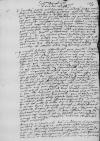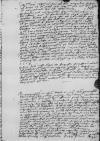⌊⌋ novissime ex ⌊Madritio⌋ 1528-10-12⌊12 Octobris praeteriti1528-10-12⌋, cum dominus ⌊Levitius⌋ primum 1528-09-09⌊nona Septembris1528-09-09⌋ a ⌊Belgis⌋ per mare ad me in Madritio applicuit, et omnia, quae tum agebantur et qualiter ⌊maiestas caesarea⌋ per secretarium ⌊Ioannem Lalmant⌋ cum responso valde inconveniente me expediverit. Quo non contentus (videbatur enim novam tragoediam et duriorem priore concitare) me huc conferre fuerim coactus, reluctans desiderio meo redeundi, quod certe fuit vehementissimum, nihilominus fides mea in Maiestatem Vestram Serenissimam id superavit et me hic hucusque detinuit. De quo essent plurima scribenda, si me tempus non deficeret, quandoquidem hac hora mihi nuntiatum est, postam in Flandriam ituram, quam nolim negligere, igitur priores meas litteras duplicare non potui et non possum etiam, ut velim, esse copiosior, dabit itaque brevitati veniam.
In ⌊⌋ descripsi difficultates, quas timebam, de quibus credo, Maiestatem Vestram non parum fuisse turbatam. Et revera turbarant me plurimum. Qua de re, ut animum Maiestatis Vestrae Serenissimae reficerem et eum non sinerem pendere ulterius, cum hac posta litteras has tumultuarias scripsi, quo sciret saltem in compendio, quomodo negotia Maiestatis Vestrae Serenissimae habeant.
Perveni ⌊huc⌋ 1528-10-16⌊16 Octobris novissimi1528-10-16⌋ et hucusque omnes intendi nervos et per opportunitatem atque importunitatem aliquoties conveni ⌊caesarem⌋, conquestus de responso, quod ⌊Lalmant⌋ mihi dederat. Unde meo maximo labore et iugi diligentia effeci tandem, opera potissimum domini ⌊magni cancellarii⌋, quod ⌊maiestas caesarea⌋ remisit Maiestati Vestrae et eius successoribus adoham retentam et non persolutam tempore illustrissimae olim ⌊matris⌋ Maiestatis Vestrae Serenissimae, quam hic taxarant ad summam sexaginta milium ducatorum, quae dicebatur omni iure potuisse repeti, si caesar voluisset, eum de gratia et exemptione ab huiusmodi solutione nihil constaret. Et
cf. Ter. An. 126 ⌊hinc illae lacrimaecf. Ter. An. 126 ⌋, quod ⌊Lalmant⌋ tantopere laborabat, sperans ex his etiam suam partem, qua ad praesens, Deo gratia, frust
<r>
atus est. Dedit praeterea ⌊caesar⌋ Maiestati Vestrae Serenissimae in recompensam adohae, quam officiales Maiestatis Vestrae Serenissimae solverunt per haec tempora, mille et ducentos ducatos in fiscalibus exigendis in ⌊Ducatu Barensi⌋ promisitque deinceps in adohis futuris instituendis semper se gratiam Maiestati Vestrae Serenissimae facturum. Quod dimitteretur Maiestati Vestrae adoha, non potui efficere, cum neque serenissimo ⌊Bohemiae regi⌋ dimittatur, sed ex fiscalibus, quae pro ⌊caesare⌋ in dominiis Maiestatis Vestrae Serenissimae exiguntur, habitura est semper aliquam recompensam.
Obtinui etiam a ⌊caesarea maiestate⌋ litteras commendaticias ad viceregem, ⌊principem de Oranges⌋, et ⌊collaterale consilium⌋ pro ⌊Statu Barensi⌋ et ⌊officialibus⌋ eiusdem. Exprimitur tamen in eis, quod si qui contra ⌊suam maiestatem⌋ deliquerint, castigarentur et nulla Maiestati Vestrae culpa impingeretur. Item alias litteras observatorias iurium et privilegiorum Maiestatis Vestrae etiam impetravi in amplissima forma, sic quod deinceps Maiestas Vestra Serenissima secure in utramque aurem de ⌊Statu Barensi⌋ dormire poterit. [Relin]quam etiam hic tot amicos Maiestati Vestrae Serenissimae, qui, si quando opus erit, negotiis et rebus Maiestatis Vestrae non deerunt, et, ut reor, n[on] erit amplius necessarium, quod aliquem in suis expen[sis] [hic] habeat, cum iam omnia sunt transacta, quae pro securitate ⌊St[a][tus] huius⌋ Maiestati Vestrae fieri {fieri} debuerant. In quibus si fors[a][n] non servivi certe, ut potui, neque in his quicquam mihi arrogo, nam boni servi, cum omnia feceri<n>t, adhuc dicere debere<n>t:
cf. Luc. 17. 10 servi inutiles sumus, quod debuimus facere, fecimus ⌊servi inutiles sumuscf. Luc. 17. 10 servi inutiles sumus, quod debuimus facere, fecimus ⌋.
Quam primum ⌊caesar⌋ istas expeditiones et litteras manu sua firm[a]verit et sigillatae fuerint, maiestati suae nomine Maiestatis Vestrae Ser[enissimae] immensas habiturus sum gratias et dicto,'vale' recta ad ⌊Val[lem] Oleti⌋ me conferam, in
<de>
missurus in ⌊Galliam⌋ pro salvo condu[ctu]. Qui si mihi dabitur, non diu immorabor, quo quantocius Maiestatem Vestram Serenissimam supplex videam et quam copiosissime de omnibus certio[rem] faciam. Sin aliter, cum hoc tempore non commode navigatur, cf. Ov. Am. 1.4.54 ⌊consilium nobis resque locusque dabuntcf. Ov. Am. 1.4.54 ⌋.
Dominus ⌊Levitius⌋ nullam mihi provisionem pro reditu a Maiestate V[estra] Serenissima attulit, dixit dumtaxat, magnificum dominum ⌊Aliphium⌋ dix[isse] me bene scire, quomodo redire debeam. Et cum id amiser[im], quod mihi cum prima expeditione et responso promittebatur, nescio quomodo aliter redire potero, nisi a ⌊Welzeris⌋ ac[ci]piam viaticum, quod non potest esse minus quingentis ducatis, quandoquide[m] nescio, quando ex ⌊Hispania⌋ ire possim, si salvus conduc[tus] in ⌊Gallia⌋ mihi negabitur, et hoc durissimo hiemis tempore non audeo me ⌊Neptuno⌋ credere. ⌊Quem⌋ prius crebro in maximis periculis expertus sum,
cf. Pub. com. 17.14.4 improbe Neptunum accusat, qui iterum naufragium facit ⌊nollem eum iterum stulte accusarecf. Pub. com. 17.14.4 improbe Neptunum accusat, qui iterum naufragium facit ⌋.
In hoc expeditionis meae gaudio nihil est, quod me magis affligat, quam quod tempore, hoc est a novem mensibus, quo exivit dominus ⌊Levicius⌋, litteras non acceperim, cum ex ⌊Ducatu Barensi⌋, tum etiam a Maiestate Vestra. Cum tamen prius Maiestas Vestra Serenissima commit[tere] scribi solebat saepius et duplicatas, et triplicatas in rebus interdum non admodum arduis, nescio qui fit, quod in hac tempor[um] metamorphosi, in qua summopere egebam instructione Maiestatis Vestrae Serenissimae, nihil fuerit ad me scriptum, et ne quidem domino ⌊Levitio⌋. De adoha itidem numquam fui bene edoctus, quid esset, quomodo exigeretur aut ad quantam summam ascender[et], de quo aliquoties me ⌊caesar⌋ interrogavit. Quod si scivissem, quant[um] post mortem illustrissimae dominae ⌊matris⌋ Maiestatis Vestrae fuisset solutum, efficacius in rem et commodum Maiestatis Vestrae egissem cum ⌊caesare⌋, quem – mehercle – numquam antea adeo propensum rebus Maiestatis Vestrae Serenissimae offendi, quam in hac mea expeditione. Ideo in h[is] ex toto caecutiens id feci, quod videre et intelligere pot[ui].
Dictum fuerat ⌊caesari⌋, quod adoha {quod adoha} haec quoties impon[e]retur, efficeret in dominiis Maiestatis Vestrae Serenissimae octo mil[ia] ducatorum et ultra. Ad ea quid responderem, non habebam, quam quod intellexerim, non excedere summam quingentorum ducatorum. Sic tandem dedit ⌊maiestas sua caesarea⌋ ex fiscalibus mille ducentos ducatos, quibus fortassis et me hinc expedivit. Qua de re si in his a me est erratum, non potest mihi non dari venia, cum nesciverim, quomodo ista habeant. cf. De virtutibus q. 1 a. 6 arg. 3 recessus a perfectione practici intellectus diminuit peccatum; ignorantia enim excusat vel a tanto, vel a toto ⌊Ignorantia excusat peccatumcf. De virtutibus q. 1 a. 6 arg. 3 recessus a perfectione practici intellectus diminuit peccatum; ignorantia enim excusat vel a tanto, vel a toto ⌋.
Serenissimae ⌊maiestati regiae⌋ ad praesens ob temporis angustiam scribere non potui, ut tamen Maiestates Vestrae Serenissimae, quomodo omnia hic habeant, non nesciant, hoc est compendium.
De duello, quomodo non successit, serenissima ⌊maiestas regia⌋ ex litteris ⌊caesaris⌋, quae ad ⌊Ferdinandum regem⌋ missae sunt, accipiet.
cf. Hor. Ars 139 parturient montes, nascetur ridiculus mus ⌊Natus est mus iste ex his montibuscf. Hor. Ars 139 parturient montes, nascetur ridiculus mus ⌋, quem praedixeram. ⌊Caesar⌋ pro futuro Martio vel Aprili omnino in ⌊Italiam⌋ se parat. Colligitur ingens classis, gentes, commeatus et pecuniae, sed
cf. Vulg. Io 20.25 nisi videro in manibus eius fixuram clavorum et mittam digitum meum in locum clavorum et mittam manum meam in latus eius, non credam ⌊cum toties sim deceptus, non credam, nisi digitos immiserocf. Vulg. Io 20.25 nisi videro in manibus eius fixuram clavorum et mittam digitum meum in locum clavorum et mittam manum meam in latus eius, non credam ⌋. Aliqui dicunt, quod cum hac classe ad Belgas traicere debeat. Quocumque ierit, erit nostris terris propinquior. Hinc est, quod nuper mihi dominus ⌊magnus cancellarius⌋ dixit: quamvis iam discedo, tamen nos paulo post non fore multum disiunctos.
⌊Caesar⌋ cum suis liberis domino ⌊Philippo⌋ et domina ⌊Maria⌋ optime valent. Non est, quod ob postae celeritatem addere possim amplius, quam quod istam veteris adohae remissionem et benevolentiam ⌊caesaris⌋ Maiestatem Vestram Serenissimam latere nolui.
Cui me suppliciter commendo. Deus Omnipotens Serenissimam ⌊regiam⌋ et Vestram Reginalem Maiestatem quam diutissime cum liberis et actionibus suis felices et incolumes conservet et contra omnia adversa tueatur.


